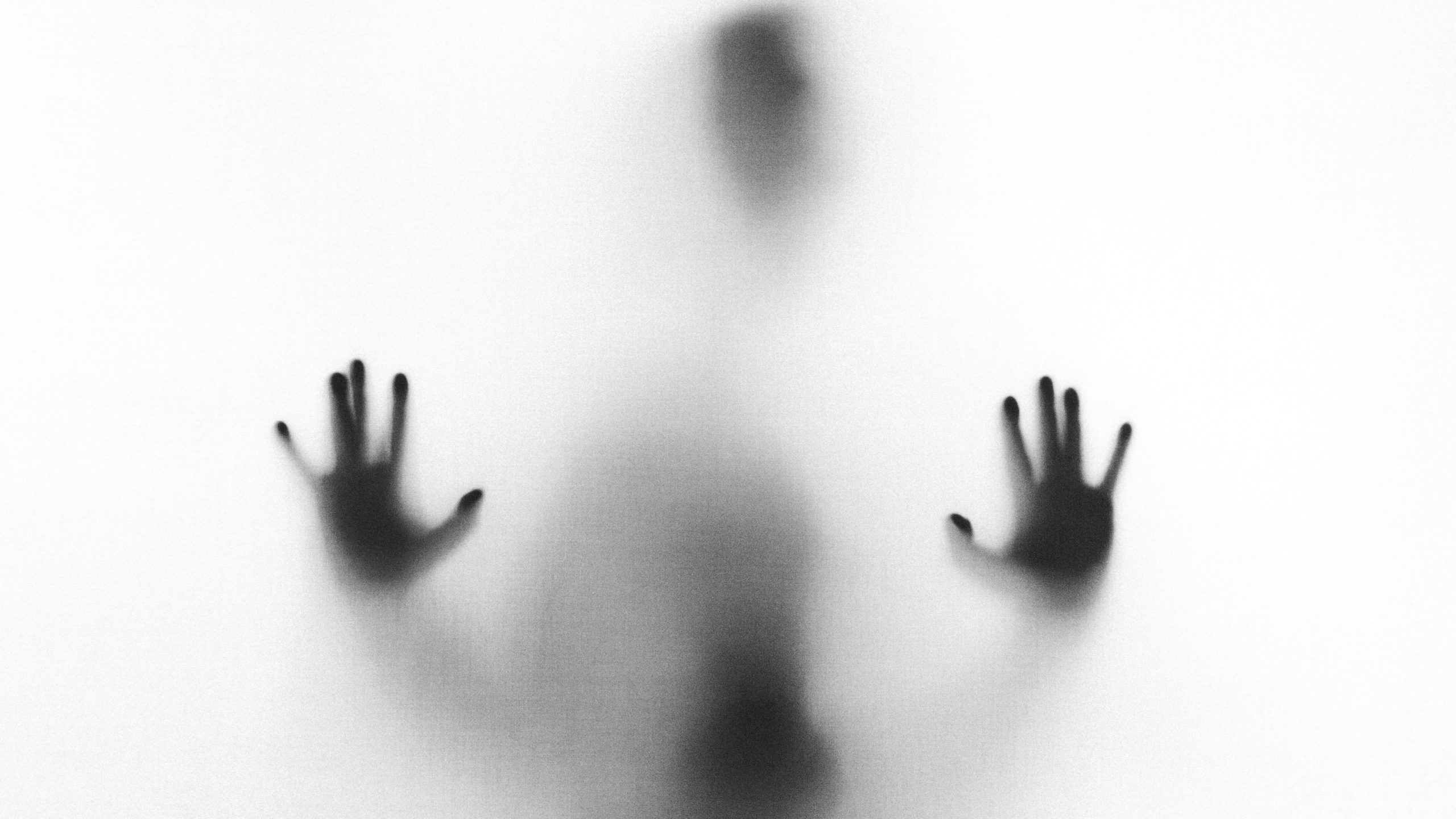According to《2020’s Survey Report In Depression Sufferers》, most patients said they were misunderstood by people around them when their illness went public. What consequences has this phenomenon brought to their lives?
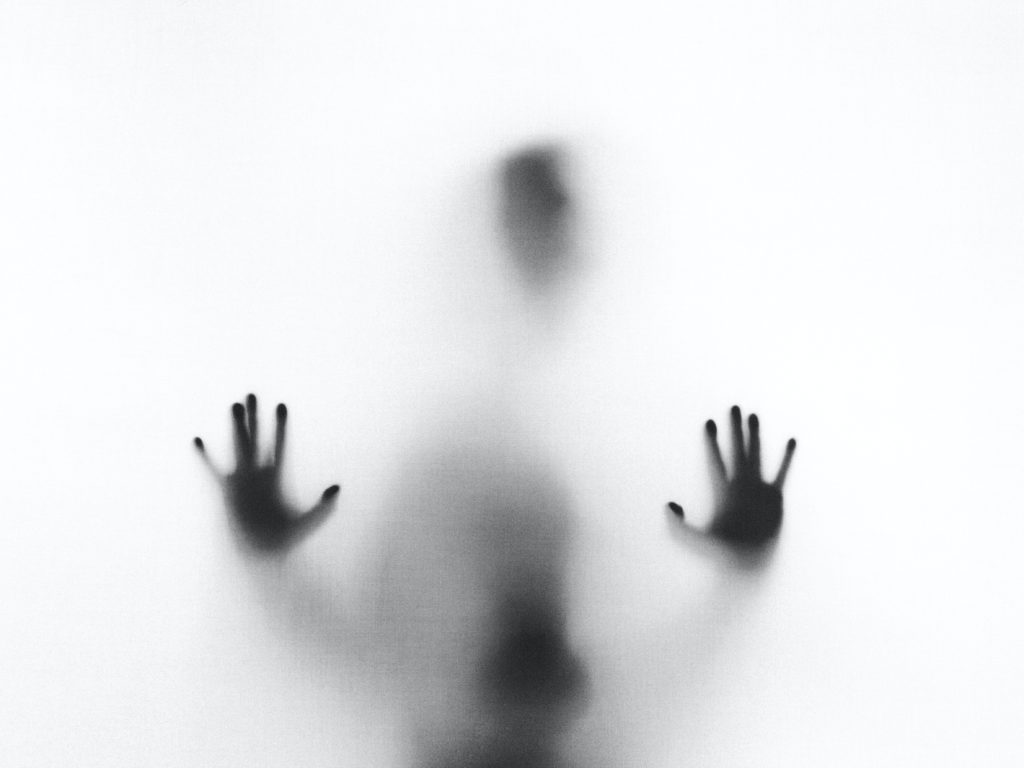
Sitting in his daughter’s bedroom, Chengai Li’s (assumed name) father still cannot forget what happened three years ago. When he came home from work that day, his daughter, who quitted her job due to depression, did not open the door for him as usual. The room was in the darkness and as soon as he touched the doorknob of her bedroom, a letter fell from the back of the door, which he knew exactly from whom. The hour-hand had just crossed eight, but his daughter was lying in bed and seemed fast asleep…In a split second, his mind completely went blank and he even felt out of breath.
He tried to wake her up but made a few unsuccessful attempts. The letter, which was the last thing from his daughter, said: The world is too noisy, full of blamed-filled messages, misunderstanding and discrimination. I really want to get rid of these restless voices and be quiet for a while.
Chengxuan Li (assumed name), who is Chengai’s father as well as a staff works on public transport in Zhejiang, said: “My daughter is a very young depression sufferer, I watched her once had deep passion for life but lost interest towards everything later on. I watched her perform as a cheerful and talkative girl and gradually gave up and became silent. I watched her suffer from many misunderstandings and prejudice due to her disease.
However, as a father, I just told her do not need to care about what others said and concentrated on the treatment, but I did not tell her the unkindness from those people came from their stigma of depression and this was a serious error that should be corrected.”
Sadly, now three years later, similar “mistake” is still pushing more sufferers into an abyss. When put “depression” into the search bar on social media, it is not hard to find that almost every day, there are patients telling stories of being discriminated against because of their diseases. According to 《2020’s Survey Report In Depression Sufferers》, most patients said they were misunderstood by people around them when their illness went public.
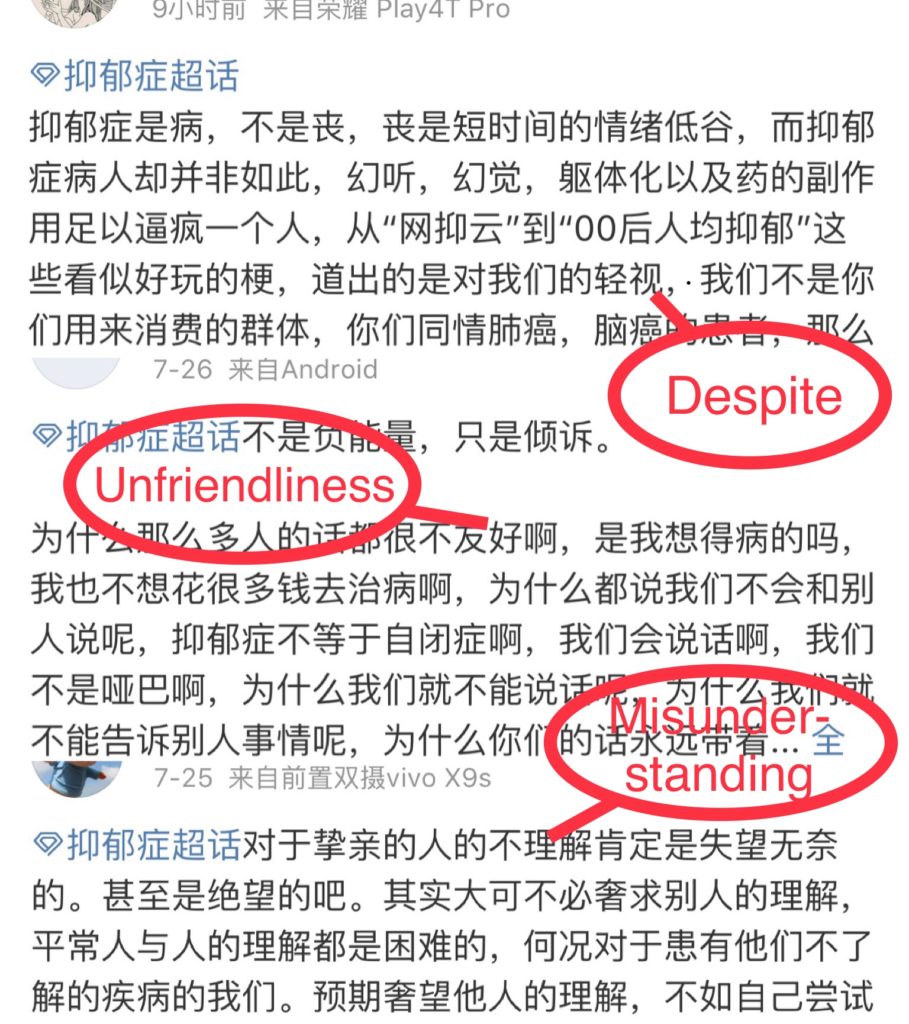
Quan Lin (assumed name), who suffer from depression for more than five years and was once obsessed with the Internet, deactivated her social media account after repeatedly receiving negative comments and being described as as “psychologically fragile”. She said: “I have not been on social networks for four or five years, compared to the reality, the anonymity in social media seems to magnify the stigma of depression. Everyone can hide behind their accounts to say something that they do not need to be responsible for. And once you start a communication with strangers, there is a risk of suffering secondary damage. So I gradually began to talk less, or not at all.”
Lu Ge, another sufferer added: “I think the most disturbing part is people call me monster when I suffer from depression, or they look at us with wretchedness or sympathy in their eyes and getting more attention that does not belong to myself makes me extremely nervous.”
In addition, as members of the vulnerable group, people with depression sometimes receive special care and treatment, which however is not always a good thing for them. When referring to her experiences, Lu Ge mentioned that compared with estrangement, she was more afraid of others’ one-sided pay without limits.
“I was once in a relationship with a girl who, when she knew I was suffering from depression, became very cautious with me. And she was always yielding to me unprincipled for fear that something would irritates me. However, as a mater of fact, what she behaved just made me feel like I was the one that different from anyone else. I would rather get along with others on an equal footing, at least in this way, I earn respect,” said she.
Poor social support allows patients to consciously isolate themselves from the world as a self-protection. And at the same time, more patients begin to resist treatment due to the psychological pressure brought by the outside. According to 《2020’s Survey Report In Depression Sufferers》, because of the stigma against depression, the number of people who refuse to seek help and fail to recover are on the rise. In China, nearly 80 percent of patients remain undetected, while only ten percent receive professional treatment.
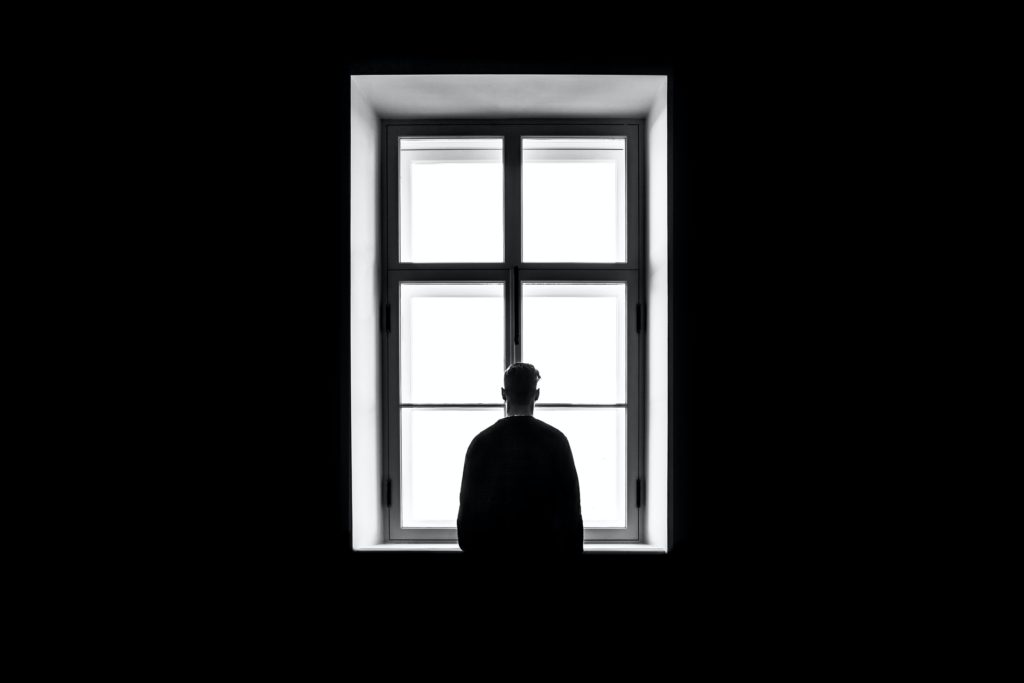
Among the sufferers who participated in the survey, a large amounts of them said that they were described as superstitious, neurotic, spoiled, poor tolerance, or even blocked by people around them after they originally perceived their depression. When those people internalize this stigma and develop a sense of shame, they have less possibility of adhering to their treatment. And this description was also confirmed by Chengxuan Li when he mentioned that her daughter attempted to give up the treatment for several times.
Linxin Yu, a psychological counselor who was a postgraduate from Zhejiang University, explained this phenomenon through the different modes of thinking between the sufferers and non-sufferer. He said: “Sufferers tend to magnify themselves and even considered themselves as the center of attention.
Besides, having a tendency to selectively extract negative information, they are easily become nervous and anxious when being viewed in a different light. If things go on like this and when they have a negative experience in a relationship, they will develop a potential attitude, that is, keep the distance from all kinds of emotions.” And this way of thinking, together with the unfriendly social environment, makes people with depression more vulnerable and disadvantaged.
Sanjin Ma, a psychology teacher at a University in Wuhan and a national psychological counselor, added: “The stigma of depression is so severe that some patients are afraid of losing friends or be negatively evaluated by others when their depression exposed. And that is why ‘masked depression’ increasingly prevailed. These patients enjoy all the experiences of depression, but appear to be very different from their inner worlds, and by the time they are detected, the best time for treatment is often missed.”
And compare to general sufferers, successful public figures always face more misunderstanding and require more courage when choosing to make their depression public. In August 2019, Chinese actor Yizha Re revealed her severe depression on social media platform, followed by countless hot comments within a short time. A number of people questioned why glamorous stars would also suffer from this mental illness.
In the face of those doubts, once on the edge of outbreak and death for many times, the actress sincerely responded: “This disease has nothing to do with what social status you are, what you look like and how old you are. By making this decision, I want to do my bit to attract more people’s attention to depression and help sufferers like me get through the difficult times.”
Despite this, the criticism did not stop at all, instead, Yizha’s strong retaliation led to more and more controversies and cyber violence. Using depression to sensationalize her celebrity has become one of the most frequent terms tied to her. In the end, she had to issue a statement via lawyers and use legal ways to defend her rights and interests.
Peng Wang, a specialist in studying stigma of depression, says: “In reality, there are not many patients fight back when they suffer from being misunderstood. As one of them, Yizha’s reaction is relatively unfamiliar to the public. And as a public figure, she is bound to get more attention and judgment, and the malice will also be magnified. At the very least, this controversy suggested that the stigmatization of depression in society was more serious than we had imaged.”
In addition to the decline in the number of people receiving treatment, the poor knowledge in this respect also brings about a wave of so-called depression sufferers. On July 9th, Sina weibo’s administrator publicized a user who pretended to be a patient with depression for two years to gain attention and sympathy, which has caused hot debates on the Internet. And before this, depression is even laughingly called by netizens as the secret of wealth on Blibli, a video sharing platform. Many vloggers’s fans have seen a great growth when they referred to their depression in the videos and described themselves as wretches. Even on Zhihu, a knowledge spreading and sharing platform, there are users who claim to be depressed looking for people to donate money to them.
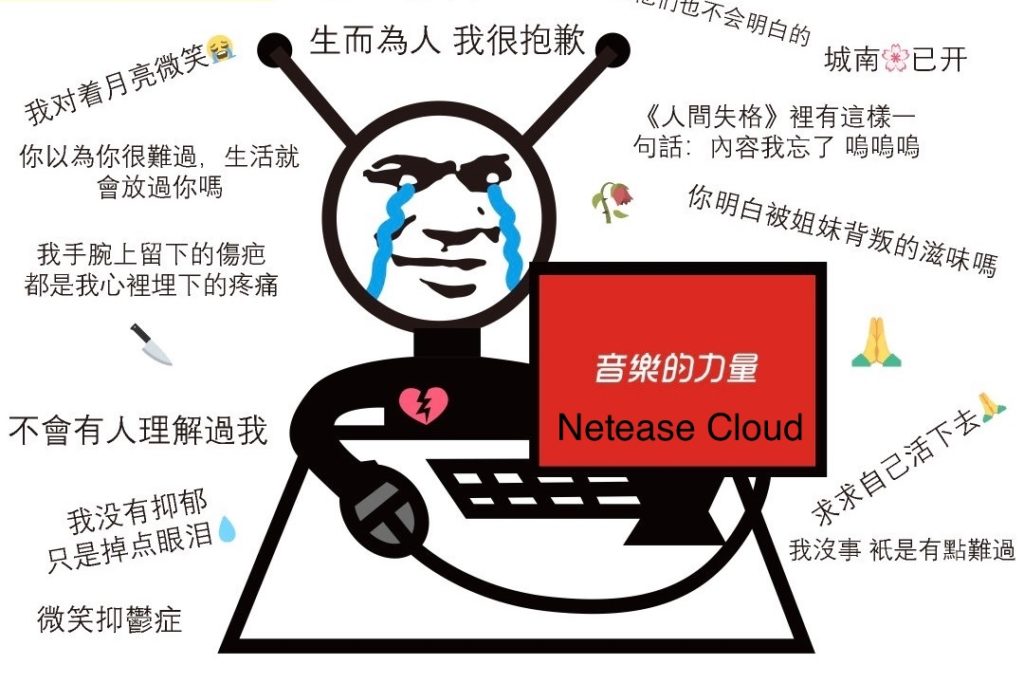
The phenomenon of “per-capita depression” arises the disgust and outrage in the public, especially those who are not friendly to depression. It becomes more difficult to remove the original stereotype from their minds. In the digital society where young people are the main users, some teenagers even regard depression as a trend.
Lin Yu, an experienced Internet user said: “Many people seek emotional outlet on social media in an unhealthy way. Anyone can express that they are depressed and use depression as an excuse for doing something wrong, and after a few days, their sentiment recover and they behave as same as normal people again. We cannot rule out that there are some people indeed are suffering from the disease. However, the percentage of ‘patients’ on the Internet is much higher compared to the actual data. As an onlooker, I gradually get bored with depression.”
All these in turn lead to lots of fake articles about depression posted by popular science accounts. “A large numbers of online questionnaires and tests that tell you if you have depression are not medically accurate and truthful, and are highly misleading to people who have a fuzzy understanding about depression.” Peng Wang says. It seems that depression sufferers are getting stuck in endless cycle of being stigmatized and misunderstood.
According to Shuliang Mo, a professor of psychology at Central China Normal University, science and education are still the most important factors to fight against stigma. “Mental health education should be strengthened at all levels and in all types of education systems, and parents should also actively intervene in the media that young people are exposed to.”
Talking about whether improve Internet regulation could help reduce the stigma, Peng Wang suggests that it plays a small role in tackling the problem while also confirms the importance of education. He said: “The administrators of social media are not specialists in a certain field and have no professional knowledge of depression. In addition, it is difficult to judge whether a subjective statement is correct or not. Therefore, in order to purify the online environment and get rid of the stigma, it is necessary to educate depression from the younger generation who use media for entertainment and studying.”
According to Xiaoxiao Qian, a medical doctor from the University of Bristol in the UK, the stigma of depression is also closely related to the negative ways of Chinese media reporting on relevant news. In recent years, surge in reporting cases of suicides and homicides by people with depression can be seen in all kinds of media, including suicides by students at prestigious universities, stabbing passengers to death by ride-hailing drivers, and a mother running off and drowning with her son etc.
“Although there is a link between depression and suicide, but up to now there is no scientific evidence that depression is bound to contribute to serious consequences of suicide or homicide.” says Qian, “However, many journalists tend to be vague about the details of the cases and do not delve into the root causes of the tragedy, which may lead to misunderstanding of depression and its sufferers.
On the one hand, we need to use the media to raise public awareness of depression. On the other hand, the media should report news on a case by case basis, not only focus on the outcome of the incident, but also more on the details of the treatment of these people.”
There is a long process involved before removing the stigma of depression from the public and this will not be succeed only when people from different walks of life offer help and support. Chengxuan Li began to participate in activities to educate depression in the community after his daughter’s tragedy. He said: “As a member in the society, I want to do my bit to help more people realize that depression is a mental illness, but people with depression are innocent and they suffer a lot. What they need is timely treatment rather than discrimination. I really hope everyone can give them more kindness and understanding and do not let the same tragedy happen again and again.”
